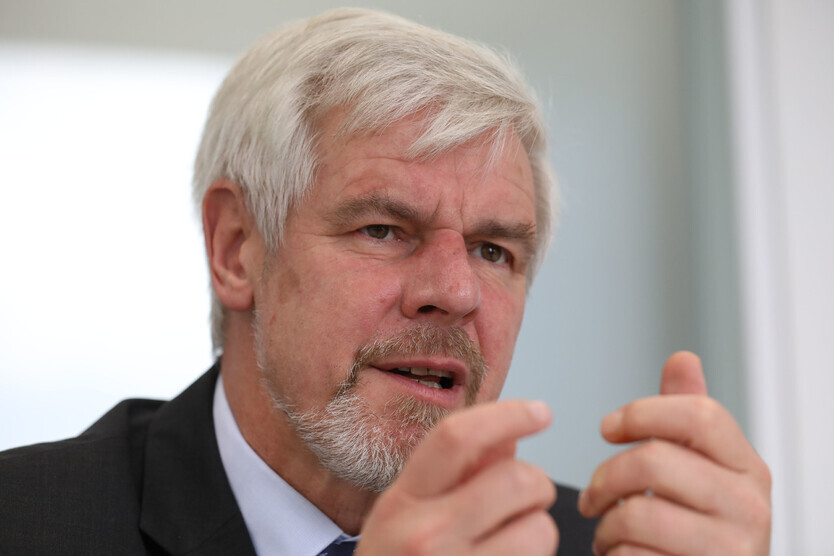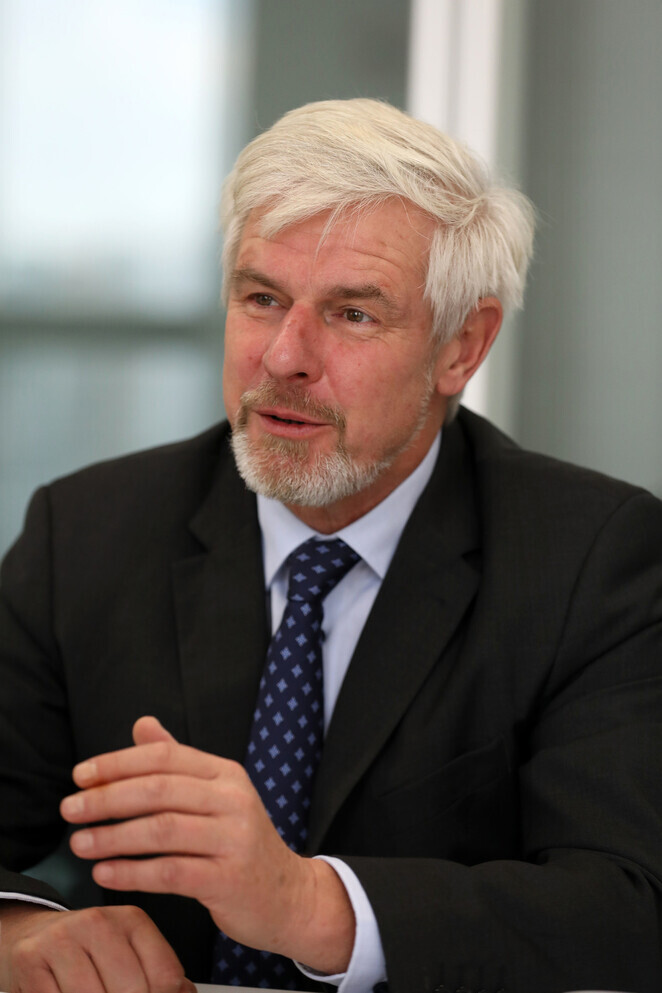hankyoreh
Links to other country sites 다른 나라 사이트 링크
[Interview] Germany is rising to occasion in European security order, says ambassador to Korea

Russia’s invasion of Ukraine in late February has had major implications for the European landscape. Germany, which had stayed circumspect about the arms race in the 70-odd-year post-war period, is in the midst of overhauling its security policy, while changes are also observable in its plans to phase out nuclear power by the end of 2022.
Speaking to the Hankyoreh on Oct. 5, Ambassador Michael Reiffenstuel of Germany remarked that the country’s recent move to play a larger military role in Europe is its way of “taking up” the responsibility expected of it by the international community. Reiffenstuel also reaffirmed the country’s intent to close its nuclear plants, commenting on the risks they pose.
The following is the Hankyoreh’s interview with the ambassador.
Hankyoreh: The war in Ukraine has lasted for more than seven months now.Michael Reiffenstuel: Let me first express that Russia’s war in Ukraine is a blatant breach of international law. But it’s more than that as well; it’s a threat not only to the European but also the international security and peace order. Germany has made clear that it will give Ukraine any possible support in order to defend itself. We have also taken in more than 1 million Ukrainian refugees. I think nobody can say how long this war will last. It is up to President Putin to end it.
Hankyoreh: Germany has recently expressed its intention to take a military leadership role in the region, with a recent announcement that it will maintain defense spending at 2% of GDP even after the 100 billion euro (US$101 billion) special fund runs dry.Reiffenstuel: As Chancellor Olaf Scholz said very early on, the Russian attack on Ukraine is a real watershed moment in European security. We consider it the most serious threat to European security since the end of the Second World War. It also changed the whole security structure we had in place for the past 50 years with the so-called Helsinki accords [signed in 1975]. It is clear that we need an efficient, well-equipped modern federal army in order to protect freedom and democracy not only in Germany, but also amongst all alliance partners in Europe. This is why the special fund was allocated, to make swift investments where they are needed.
Hankyoreh: Some have voiced concerns about Germany’s rearmament.Reiffenstuel: For quite a long time, the US was constantly appealing to Germany to increase its defense spending. To quote what Defense Minister Christine Lambrecht said recently: “Germany’s size, its geographic location, its economic power, in short, its heft makes it a leading power whether we want to or not.” So Germany is taking up this expectation [held by the international community] that we take responsibility.
Hankyoreh: Since the start of the war Russia continues to retaliate against sanctions by Germany and Europe by reducing or cutting its gas supply. What kind of measures are Germany taking to counteract this energy crisis?Reiffenstuel: Since the start of the war, we have been rapidly reducing our energy dependency on Russia and building a broader, more sustainable basis for our energy supply. In particular, we very vigorously continue to further develop renewables. The goal of this German government is to reach 80% renewables in the energy mix by 2030. The current proportion is about 47%-48%. We are starting our first LNG [liquified natural gas] terminal in Germany [in order to cut down reliance on Russian natural gas]. LNG is an intermediary bridging energy force needed to get through this crisis.

Reiffenstuel: This crisis strengthened our determination to very swiftly increase our capabilities with regard to renewable energy. We still have three reactors running. There’d been a decision by the German government to phase out nuclear energy in Germany by the end of this year. Nevertheless, in order to get us stably through the winter season, two nuclear plants will temporarily remain in operational reserve. The important point is that this is a short extension, and it does not mean any change in our basic decision to phase out nuclear energy. There is strong social consensus on this decision, because, among other reasons, we consider the risks to be very high.
Hankyoreh: How was Germany able to produce such a strong social consensus on phasing out nuclear power?Reiffenstuel: Over the last 50 years we have been searching and discussing locations for a permanent disposal site of radioactive nuclear waste. For now, there is no 100% safe solution — worldwide. This makes it very clear to us that nuclear energy is simply, in the long term, not a reliable or safe source of energy. In fact, my generation directly experienced the radioactive clouds coming over Germany after the Chernobyl disaster, which made a strong impression on us.
Hankyoreh: The energy crisis is putting citizens through a lot of suffering. Does domestic public opinion make it difficult to keep up this international cooperation against Russia?Reiffenstuel: What we’ve seen is unwavering support for Ukraine from the public for more than half a year. The German government is taking a number of measures, including a price cap on gas prices, so that consumers can reliably afford energy prices.
Hankyoreh: What is Germany’s position on climate change?Reiffenstuel: Climate change is relevant for all of us, but the consequences of climate change are especially serious for many of the less developed and least developed countries. Another aspect is that climate change, and therefore climate policy decisions, will have substantial consequences for the younger generation and their future. We need a bold climate policy today and bold support for strengthening renewable energies. The European Union has pledged to reduce greenhouse gas emissions to 55% [compared to 1990 levels] by 2030. Germany has pledged 65%. The EU has set a goal of achieving carbon neutrality by 2050, but Germany has set it for 2045. Maintaining 2 degrees Celsius [in global warming compared to pre-industrial levels] is not sufficient. We must work together to keep global warming below 1.5 degrees.
Hankyoreh: What are your thoughts on Ukraine joining NATO?Reiffenstuel: The question of applying for NATO membership is a national decision that has to be made by a country itself. But in order to join NATO, also, there is a whole set of requirements that need to be met, be it basic values, like democracy and no corruption, as well as the interoperability of the military aspects.
By Noh Ji-won, staff reporter
Please direct questions or comments to [english@hani.co.kr]
Editorial・opinion
![[Editorial] Penalties for airing allegations against Korea’s first lady endanger free press [Editorial] Penalties for airing allegations against Korea’s first lady endanger free press](https://flexible.img.hani.co.kr/flexible/normal/500/300/imgdb/original/2024/0502/1817146398095106.jpg) [Editorial] Penalties for airing allegations against Korea’s first lady endanger free press
[Editorial] Penalties for airing allegations against Korea’s first lady endanger free press![[Editorial] Yoon must halt procurement of SM-3 interceptor missiles [Editorial] Yoon must halt procurement of SM-3 interceptor missiles](https://flexible.img.hani.co.kr/flexible/normal/500/300/imgdb/child/2024/0501/17145495551605_1717145495195344.jpg) [Editorial] Yoon must halt procurement of SM-3 interceptor missiles
[Editorial] Yoon must halt procurement of SM-3 interceptor missiles- [Guest essay] Maybe Korea’s rapid population decline is an opportunity, not a crisis
- [Column] Can Yoon steer diplomacy with Russia, China back on track?
- [Column] Season 2 of special prosecutor probe may be coming to Korea soon
- [Column] Park Geun-hye déjà vu in Yoon Suk-yeol
- [Editorial] New weight of N. Korea’s nuclear threats makes dialogue all the more urgent
- [Guest essay] The real reason Korea’s new right wants to dub Rhee a founding father
- [Column] ‘Choson’: Is it time we start referring to N. Korea in its own terms?
- [Editorial] Japan’s rewriting of history with Korea has gone too far
Most viewed articles
- 160% of young Koreans see no need to have kids after marriage
- 2[Editorial] Penalties for airing allegations against Korea’s first lady endanger free press
- 3Presidential office warns of veto in response to opposition passing special counsel probe act
- 4Hybe-Ador dispute shines light on pervasive issues behind K-pop’s tidy facade
- 5Months and months of overdue wages are pushing migrant workers in Korea into debt
- 6Japan says it’s not pressuring Naver to sell Line, but Korean insiders say otherwise
- 7S. Korea “monitoring developments” after report of secret Chinese police station in Seoul
- 8OECD upgrades Korea’s growth forecast from 2.2% to 2.6%
- 9[Reporter’s notebook] In Min’s world, she’s the artist — and NewJeans is her art
- 10[Guest essay] Maybe Korea’s rapid population decline is an opportunity, not a crisis